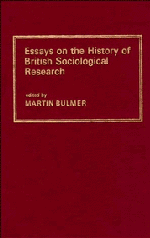11 - The uses of British sociology, 1831–1981
Published online by Cambridge University Press: 12 November 2009
Summary
Throughout the past 150 years British sociologists have consistently wanted to be useful. The image of a social science for use has been a compelling moving force in the development of the discipline both intellectually and institutionally. From the social statisticians of the 1830s, the social reformers of the 1850s, the social philosophers of the 1880s, through to the Heyworth Committee in 1965 and the campaign for a ‘policy science’ institute in the 1970s the search has been for social knowledge that would somehow crop usefully into social action. There have been many different versions of what being useful might mean, but one way or another the reference has usually been to some ascertainable contribution to the purposeful improvement of social conditions. Dissenters from this view have been few – unfortunately they do include the only man of genius British sociology has yet produced, Herbert Spencer. There have been moments, such as the very recent past, when the idea of usefulness has seemed oppressively controversial – so that at a meeting of Professors of Sociology in 1981 ‘the view was expressed’ that ‘sociology would be unwise to emphasize its immediate usefulness’ in any forthcoming struggle for UGC funds. But such hesitations apart British sociology has persistently and ubiquitously wanted to be useful sociology – and has conversely been highly sensitive to the allegation, made with sobering frequency by the various scientific, political and lay audiences for sociology, that it is actually pretty useless.
- Type
- Chapter
- Information
- Essays on the History of British Sociological Research , pp. 181 - 205Publisher: Cambridge University PressPrint publication year: 1985
- 9
- Cited by



